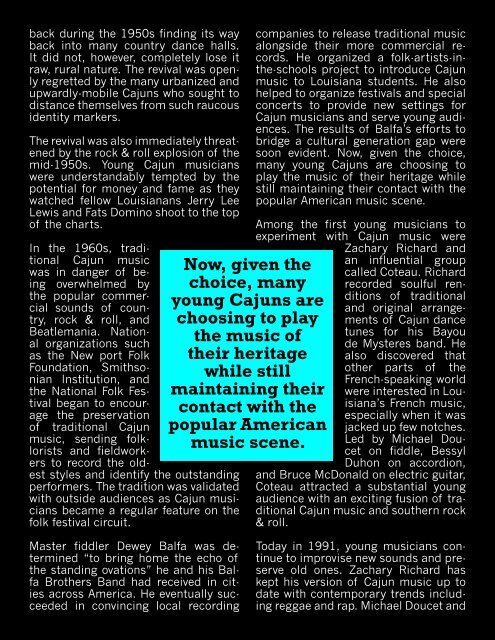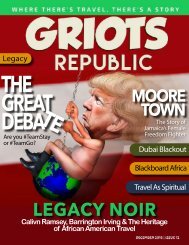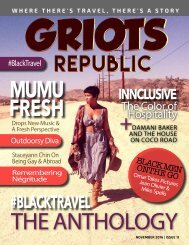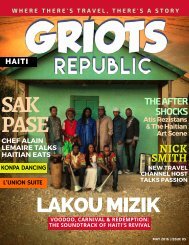GRIOTS REPUBLIC - AN URBAN BLACK TRAVEL MAG - JULY 2016
ISSUE #7: GLOBAL MUSIC In this issue we've covered global black music all around the world. Black Travel Profiles Include: Jazz Vocalist, Andromeda Turre; Conductor from Orchestra Noir, Jason Rodgers; Reggae Legend, Tony Rebel; & Miami Band, Batuke Samba Funk! For more black travel profiles and stories, visit us at www.GRIOTSREPUBLIC.com.
ISSUE #7: GLOBAL MUSIC
In this issue we've covered global black music all around the world. Black Travel Profiles Include: Jazz Vocalist, Andromeda Turre; Conductor from Orchestra Noir, Jason Rodgers; Reggae Legend, Tony Rebel; & Miami Band, Batuke Samba Funk!
For more black travel profiles and stories, visit us at www.GRIOTSREPUBLIC.com.
Create successful ePaper yourself
Turn your PDF publications into a flip-book with our unique Google optimized e-Paper software.
ack during the 1950s finding its way<br />
back into many country dance halls.<br />
It did not, however, completely lose it<br />
raw, rural nature. The revival was openly<br />
regretted by the many urbanized and<br />
upwardly-mobile Cajuns who sought to<br />
distance themselves from such raucous<br />
identity markers.<br />
The revival was also immediately threatened<br />
by the rock & roll explosion of the<br />
mid-1950s. Young Cajun musicians<br />
were understandably tempted by the<br />
potential for money and fame as they<br />
watched fellow Louisianans Jerry Lee<br />
Lewis and Fats Domino shoot to the top<br />
of the charts.<br />
In the 1960s, traditional<br />
Cajun music<br />
was in danger of being<br />
overwhelmed by<br />
the popular commercial<br />
sounds of country,<br />
rock & roll, and<br />
Beatlemania. National<br />
organizations such<br />
as the New port Folk<br />
Foundation, Smithsonian<br />
Institution, and<br />
the National Folk Festival<br />
began to encourage<br />
the preservation<br />
of traditional Cajun<br />
music, sending folklorists<br />
and fieldworkers<br />
to record the oldest<br />
styles and identify the outstanding<br />
performers. The tradition was validated<br />
with outside audiences as Cajun musicians<br />
became a regular feature on the<br />
folk festival circuit.<br />
Now, given the<br />
choice, many<br />
young Cajuns are<br />
choosing to play<br />
the music of<br />
their heritage<br />
while still<br />
maintaining their<br />
contact with the<br />
popular American<br />
music scene.<br />
companies to release traditional music<br />
alongside their more commercial records.<br />
He organized a folk-artists-inthe-schools<br />
project to introduce Cajun<br />
music to Louisiana students. He also<br />
helped to organize festivals and special<br />
concerts to provide new settings for<br />
Cajun musicians and serve young audiences.<br />
The results of Balfa’s efforts to<br />
bridge a cultural generation gap were<br />
soon evident. Now, given the choice,<br />
many young Cajuns are choosing to<br />
play the music of their heritage while<br />
still maintaining their contact with the<br />
popular American music scene.<br />
Among the first young musicians to<br />
experiment with Cajun music were<br />
Zachary Richard and<br />
an influential group<br />
called Coteau. Richard<br />
recorded soulful renditions<br />
of traditional<br />
and original arrangements<br />
of Cajun dance<br />
tunes for his Bayou<br />
de Mysteres band. He<br />
also discovered that<br />
other parts of the<br />
French-speaking world<br />
were interested in Louisiana’s<br />
French music,<br />
especially when it was<br />
jacked up few notches.<br />
Led by Michael Doucet<br />
on fiddle, Bessyl<br />
Duhon on accordion,<br />
and Bruce McDonald on electric guitar,<br />
Coteau attracted a substantial young<br />
audience with an exciting fusion of traditional<br />
Cajun music and southern rock<br />
& roll.<br />
Master fiddler Dewey Balfa was determined<br />
“to bring home the echo of<br />
the standing ovations” he and his Balfa<br />
Brothers Band had received in cities<br />
across America. He eventually succeeded<br />
in convincing local recording<br />
Today in 1991, young musicians continue<br />
to improvise new sounds and preserve<br />
old ones. Zachary Richard has<br />
kept his version of Cajun music up to<br />
date with contemporary trends including<br />
reggae and rap. Michael Doucet and














